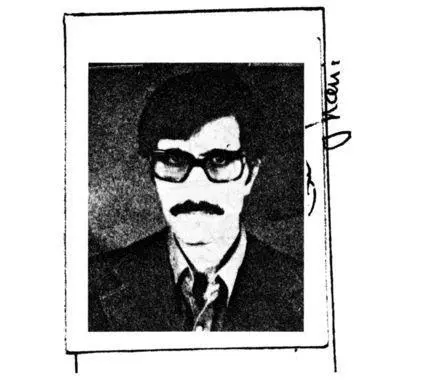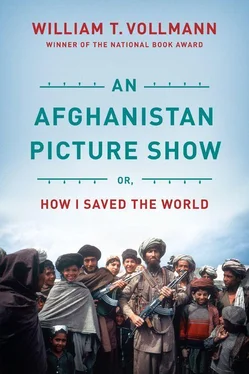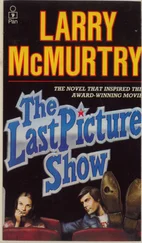“No, no, they don’t do that,” said Majrooh. “If you study — if you have time — you will understand that all the groups who are here, they are quite efficiently fighting. A small proportion, of course, and there are always in a situation like this internal problems and problems of organization, but it is not the whole picture. And now, as you have heard, they are fighting in Panjsher quite effectively, and the fifth Soviet offensive was just checked there …”
“That’s mainly the Jamiat group, Rabbani’s group?”
“No, I have told you, there are many others who have come to help, as for instance from Ghazni. It’s not a serious problem, as you seem to think. They’re not just fighting each other. There are some, but it’s not the general rule.”
“So you think that the United States should arm the Resistance.”
“Absolutely.”
“Well, if you could give me a proposal as to how that ought to be done …”
Majrooh fitted his fingertips together. “I think that we … we are in Pakistan, you know. And we try to have good relations with the official authorities, and I think that all this help must come through the official authorities.”
How pleased the Reliable Source would have been to hear these words! Evidently the puppet masters yet held the strings.
“So we should give arms to the government of Pakistan and let them decide how to distribute them?” asked the Young Man.
“No, I would not make a recommendation like that. Only when they decide, the Americans, they should discuss it with the authorities in Pakistan.”
From the sofa the General said, “I know there is a firm in London that can deliver arms anywhere in the world, including Pakistan.”
“The Americans, they know how to do it,” said Majrooh. “With the Pakistani authorities. They know the problem.”
“If you had those weapons,” said the Young Man, “it would just depend on the circumstances who you gave them to?”
“I’d not accept them personally,” said Professor Majrooh. “I’d tell you where to go, but I would not take this military responsibility. But when the question is there, I think I could give you some advice — practical advice.”
STATEMENT OF JUDGE DR. NAJIB SAID, ISLAMIC UNITY (LIBERAL COALITION)
The offices of the factions were scattered about Peshawar. You took a rickshaw. If the driver was Pakistani he might have to stop and ask directions a few times, but an Afghan would know. The metal trim of Pakistani-driven rickshaws was decorated with pictures of sexy Indian movie stars, whereas the Afghans preferred pictures of men with machine guns.
The “liberal” coalition known as Islamic Unity of Afghan Mujahideen was neither close to nor far from the fundamentalist Islamic Unity of Afghan Mujahideen. It was in a tan cement building several stories high. There were no guards, but then everyone seemed to be a guard. Big, well-built men lounged around in the courtyard and on the terraces, chatting, cradling their guns. Pizzarda, †the Secretary-General, had work to do, so he took the Young Man to his office, told him to be comfortable, and sat behind his desk. Everyone had stood up at his arrival except for a fat man in a turban who slumbered on the bench, head forward, hands on lap, as the fan droned slowly. — Pizzarda slipped a second pair of glasses over his first, for reading, and began to sign papers.
This Pizzarda was a hospitable man. The General knew him well. Pizzarda had taken the Young Man personally to see the Hazarat Museum, which was a flat in a private apartment building where bits of rocket bombs and captured helicopter parts were mounted on a heavy brown pasteboard, along with gunship helicopter bullets, shrapnel fragments, a dead Ivan’s dogtag, a metal plaque that said something in Russian about what to do before you charged the accumulators; and from the corner Pizzarda took a Soviet helmet with a bullet hole going in and going out, and he grinned. They sat on the floor and had green tea, and later the Young Man took pictures, so that there stood Pizzarda forever, wearing his silver spectacles, unsmiling now with thin lips when the Young Man raised his camera for the Afghanistan Picture Show, and his beard was silver and gray and his wristwatch glittered and the helmet glittered and there was a bloodstain around the hole.
Watching him at work, the Young Man looked interestedly round the office, and it was at that time that Judge Dr. Said came in. Seeing that Pizzarda would be occupied for a few minutes longer, he agreed to talk with the Young Man. He was a tall, handsome, Semitic-looking man with a thick, dark beard. He spoke an Oxford-accented English.
“In your belief, are there many Communists in the other factions of the Mujahideen?” asked the Young Man. (It had been the General’s shrewd advice to ask about Communists. Anyone considered dangerous was called a Communist.)
Smiling, Dr. Said put an arm around the Young Man’s shoulder. “That is a very difficult question, my dear friend,” said he. “Nobody graphically understands how to put a graph on the heart of the people and the totality of the people, to know what faith they have got. But by political charter framework of the Mujahideen, by our efforts , by our endeavors , by our doctrine and our way of life, nobody is entitled to join who is thought to be pro-Communist.”
“So what do you do when you find a Communist?”
“Then we search to find the Communist people; when we find them it is difficult for the Communist people! It is difficult for us to find who is Communist. The Russians are not only fighting us by weapon; they are fighting us by K.G.B.; they are fighting us by any available type of means.”
“So, suppose that I were a member of your group, and you discovered conclusive evidence that I was a Communist. What would happen to me?”
“You should receive your tort, your punishment.”
“What would that be? Would you kill me?”

Identification page from the ration book of the kidnapped doctor
“Yeah.”
“How often does this happen?”
“Where?” said Dr. Said. “In Peshawar, or abroad?”
“In Peshawar.”
“This is difficult, because some of these questions should not be divulged, but our effort is continuously being — done, to find such people, and to give them punishment. This is our understanding — our law, and our charter. Those who are Communist by their nature, now they can realize that they can never ever divert this thing from Islamic roots. Do you understand my point?”
“Yes,” said the Young Man dutifully. He gathered his courage. “Just a few days ago,” he said, “if I’m not mistaken, uh, someone, um, a doctor was kidnapped by the Gulbuddin group, uh, because he was believed to be a Communist. Do you know anything about that?”
“No,” said Dr. Said firmly. “Just only as a rumor I have heard that. And there is no evidence , and I do not base my judgment on hearsay evidence!”
“Maybe you could tell me about an actual incident?” suggested the Young Man brightly.
“There is no evidence available to me.”
“I won’t press you.”
“Thank you.”
A few minutes later, when the interview had been concluded, Dr. Said picked up a dog-eared letter from his desk. It was in English. He had evidently forgotten about the young American snooping behind him. The letter was a plea to Afghan Refugee Commissioner Abdullah — who was said to be a partisan of Gulbuddin ‡—for clemency and help in regard to this very same kidnapped doctor. Dr. Said wrote something on the letter in Pushtu, stamped it with his seal, and gestured to one of his men, who took it off somewhere.
Читать дальше













